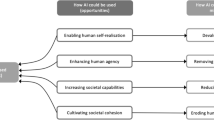Abstract
The development of axiological theories posed an acute problem of their enrichment with an ethical component. A method for transferring ethics to the scientific field is shown, which consists of including the concept of maximizing the well-being of all people affected by any situation in all axiological theories. As a formal science, informatics does not contain the ethical concept of maximizing well-being itself; however, due to its engagement in cross-disciplinary relationships with all axiological sciences, it possesses an exclusively relevant ethical relativity. Determining the metascientific bases of the ethical relativity of informatics provides opportunities for its multifaceted study from the viewpoint of science instead of poorly understood metaphysics.
Similar content being viewed by others
References
Gödel, K., On undecidable propositions of formal mathematical systems, in The Undecidable, Davis, M., Ed., New York: Raven, 1965, pp. 41–74.
Church, A., An unsolvable problem of elementary number theory, Am. J. Math., 1936, vol. 58, no. 2, pp. 345–363.
Turing, A.M., On computable numbers, with an application to the Entscheidungsproblem, Proc. London Math. Soc., Ser. 2, 1936–1937, vol. 42, no. 1, pp. 230–265.
Moor, J.H., What is computer ethics, Metaphilosophy, 1985, vol. 16, no. 4, pp. 266–275.
Capurro, R., Informationsethik—Eine Standortbestimmung, Int. J. Inf. Ethics, 2004, vol. 1, no. 6, pp. 4–10.
Introna, L.D., Maintaining the reversibility of foldings: Making the ethics (politics) of information technology visible, Ethics Inf. Technol., 2007, vol. 9, no. 1, pp. 11–25.
Gorniak, K., The computer revolution and the problem of global ethics, Sci. Eng. Ethics, 1996, vol. 2, no. 2, pp. 177–190.
Floridi, L., Information ethics: On the philosophical foundation of computer ethics, Ethics Inf. Technol., 1999, vol. 1, no. 1, pp. 37–56.
Aristotle's Nicomachean Ethics, Chicago: University of Chicago Press, 2011.
Bentham, J., An Introduction to the Principles of Morals and Legislation, Oxford: Clarendon Press, 1907.
Wittgenstein, L., Tractatus Logico-Philosophicus, New York: Dover Publication, Inc., 1999.
Ayer, A.J., Language, Truth and Logic, London: V. Gollancz, ltd., 1936.
Stevenson, C.L., Ethics and Language, New Haven: Yale University Press, 1944.
Hare, R.M., The Language of Morals, Oxford: Clarendon Press, 1952.
Scheler, M., Der Formalismus in der Ethik und die materiale Wertethik, Halle a. d. Saale: Verlag Niemeyer, 1916.
Habermas, J., Moralbewuβtsein und kommunikatives Handeln, Frankfurt am Main: Suhrkamp, 1983.
Critchley, S., The Ethics of Deconstruction: Derrida and Levinas, Edinburgh: Edinburgh University Press, 2014, 3rd ed.
Kanke, V.A., Metascientific and philosophical reasons to define the status of computer science, Autom. Doc. Math. Linguist., 2017, vol. 51, no. 3, pp. 101–107.
2018 ACM Code of Ethics and Professional Conduct: Draft 2. https://ethics.acm.org/2018-code-draft-2/. Accessed November 1, 2017.
Author information
Authors and Affiliations
Corresponding author
Additional information
Original Russian Text © V.A. Kanke, 2018, published in Nauchno-Tekhnicheskaya Informatsiya, Seriya 2: Informatsionnye Protsessy i Sistemy, 2018, No. 1, pp. 1–7.
About this article
Cite this article
Kanke, V.A. The Metascientific and Philosophical Bases of Information Ethics. Autom. Doc. Math. Linguist. 52, 1–6 (2018). https://doi.org/10.3103/S0005105518010041
Received:
Published:
Issue Date:
DOI: https://doi.org/10.3103/S0005105518010041




